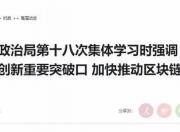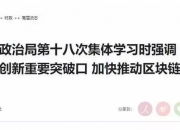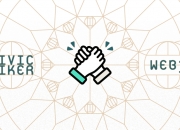Web3.0是一个宏大的概念,汇聚了我们对下一代互联网的美好向往和愿景。它是一场数据变革,数据“所有权”和身份“自主权”将从大型平台回归到用户手中,互联网将更加平等,更加开放,更加符合群体利益。
Web3.0 is an ambitious concept that brings together our vision and vision for the next generation of the Internet. It is a data change, where data “ownership” and identity “ownership” will return from large platforms to users, and the Internet will become more equitable, open and community-friendly.
Web3.0是一场数据变革
无论是Web1.0还是Web2.0,用户的线上活动都依赖特定的互联网平台。即使在Web2.0时代,用户可以是内容的生产者,但相关规则依然由互联网平台制定,用户缺乏自主权。而Web3.0以用户为中心,强调用户拥有自主权。具体体现为以下几点:
Both Web1.0 and Web 2.0 rely on specific Internet platforms for online activity. Even in the Web 2.0 era, users can be producers of content, but rules are developed by Internet platforms and users lack autonomy. Web3.0 is centred on users, emphasizing user autonomy.
首先,在Web1.0和Web2.0时代,用户对数字身份缺乏自主权。用户只有在互联网平台上创建账户,才能获得参与相应线上活动的数字身份,一旦销户则会失去权限。每创建一次账户,用户都要填写一次个人信息。不同互联网平台企业建立不同的账户体系,各账户体系规则不尽相同,用户需要管理诸多账号和密码。不同账户体系间相互独立,容易形成“孤岛”,不利于互联网生态发展,还会衍生出垄断、不正当竞争等问题。
First, in the Web1.0 and Web 2.0 eras, users lack autonomy over digital identities. Users can only get digital identities for participating in the corresponding online activities if they create an account on an Internet platform and lose their rights if they sell it. Each time they create an account, users have to fill in personal information once.
而Web3.0将赋予用户自主管理身份 (SSI) 的权利。用户无需在互联网平台上创建账户,而是可以通过公私钥的签名与验签机制建立数字身份。为了在没有互联网平台账户的条件下可信地验证身份,Web3.0还可利用分布式账本技术,构建分布式公钥基础设施(DPKI)和一种全新的可信分布式数字身份管理系统。分布式账本是一种严防篡改的可信计算范式,在这一范式中,发证方、持证方和验证方之间可以端到端地传递信任。
Web3.0 will give users the right to manage their identity autonomously (SSI). Instead of creating an account on an Internet platform, users can create digital identity through a public-private key signature and verification mechanism. In order to reliably verify identity without an Internet platform account, Web3.0 can also use distributed account technology to construct distributed public key infrastructure (DPKI) and a new, credible distributed digital identity management system.
其次,在Web1.0和Web2.0时代,用户对个人数据缺乏自主权。在大型互联网平台面前,用户个体相对弱势。面对“要么同意,要么不服务”的选择,用户只能同意个人数据被采集甚至被过度采集。如今,互联网平台高度渗透到社会的方方面面,向用户提供通信、社交、网购、资讯、娱乐等各类服务。为了获取这些服务,用户不得不让渡数据主体权利。大量用户数据集中于互联网平台,一旦泄露,将对用户隐私造成危害。一些互联网平台还可能滥用技术上的优势,诱导用户,在用户不知情的情况下收集和使用数据,并利用技术手段规避法律约束。
Second, in the age of Web1.0 and Web 2.0, users lack autonomy over personal data. Individual users are relatively vulnerable in the face of large Internet platforms. Faced with the option of “consensual or unserviceable” users can only agree that personal data is collected or even overcollected.
而Web3.0不仅赋予用户自主管理身份的权利,而且打破了中心化模式下数据控制者对数据的天然垄断。分布式账本技术可提供一种全新的自主可控数据隐私保护方案。用户数据经密码算法保护后存储在分布式账本中。将身份信息与谁共享、作何种用途均由用户决定,只有经用户签名授权的个人数据才能被合法使用。通过数据的全生命周期确权,数据主体的知情同意权、访问权、拒绝权、可携权、删除权 (被遗忘权)、更正权、持续控制权能够得到更有效的保障。
Web3.0 not only gives users the right to manage their identity autonomously, but also breaks the natural monopoly on data by data controllers under a centralized model. Distributive booking technology provides a completely new program for protecting the privacy of autonomously controlled data. User data is stored in distributed accounts as protected by password algorithms. Users decide who shares the identity information and what uses it is. Only personal data authorized by a user's signature can be used legally. The right to informed consent, access, denial, portability, removal (forgotten), right to correct, and continued control of data subjects can be more effectively guaranteed through data validation throughout their life cycle.
最后,在Web1.0和Web2.0时代,用户在算法面前缺乏自主权。算法是互联网平台的核心。算法可以进行独特的客户洞察,形成“千人千面”的用户画像,成为网络经济的制胜法宝。但近年来,算法滥用、算法作恶等问题日益突出。比如有些平台利用大数据“杀熟”,同样的商品或服务,老客户获得的价格反而比新客户要高;有些平台只推荐能带来潜在商业利益的产品甚至假冒伪劣产品,而不是对用户来说最适合、最恰当的商品;有些平台滥用人性弱点,过度激励、劝服、诱导用户消费,使人们习惯“被喂养”,不自觉地对算法投放的产品沉迷;而算法的具体原理和参数只有运营企业的少部分人才能知道,易引发利益侵占问题;还有一些平台甚至利用算法作恶,推送低级庸俗的内容或耸人听闻的虚假信息以扩大流量。
Finally, in the Web1.0 and Web 2.0 eras, users lack autonomy in the face of algorithms. Arithmetic is at the heart of Internet platforms. Arithmetic can provide unique client insight into the creation of “thousands of faces” of user portraits, which can become a winning tool for the network economy.
而Web3.0将大大提升用户在算法面前的自主权。智能合约是分布式账本上可以被调用、功能完善、灵活可控的程序,具有透明可信、自动执行、强制履约的优点。当它被部署到分布式账本中时,其程序的代码是公开透明的。用户对可能存在的算法滥用、算法偏见及算法风险均可随时检查和验证。智能合约无法被篡改,会按照预先设定的逻辑执行,产生预期的结果。契约的执行情况将被记录下来,全程受监测,算法可审计,可为用户质询和申诉提供有力证据。智能合约不依赖特定中心,任何用户均可发起和部署,天然的开放性和开源性极大地增强了终端用户对算法的掌控能力。
Wib3.0 will greatly enhance user autonomy in the face of algorithms. Smart contracts are a program that can be called, fully functional, flexible and controlled on distributed books, with the advantage of transparency and credibility, automatic execution, and mandatory performance. When it is deployed in distributed books, the code of the program is open and transparent. Users can inspect and verify possible algorithm abuse, algorithm bias, and algorithm risk at any time. Smart contracts cannot be tampered with and will be executed according to predefined logic, producing the desired results. The contract's implementation will be recorded, monitored over time, an algorithm auditable, and can provide strong evidence for user queries and complaints. Smart contracts are not dependent on a given centre, any user can initiate and deploy, and natural openness and open source greatly enhances the end user's ability to control the algorithms.
同时,Web3.0是一场信任变革,信息互联网将演化为可信的价值互联网,并衍生出不同于传统模式的分布式经济、分布式金融。它是一场组织变革,企业的痕迹或将被“抹除”,没有董事会,没有管理层,没有公司章程……仅依靠算法就可开展各类业务活动,“无组织形态的组织力量”将成为经济系统的内在驱动。它是一场体验变革,互联网将变得更加智能化、人性化和个性化。通过增强现实(AR)/虚拟现实(VR)/扩展现实(XR)、可穿戴设备、人机接口等形式,人们可在立体全息的空间中,真实体验到前所未有的交互感、沉浸感和参与感。它是一场社会变革,覆盖社交、娱乐、生产、消费、商务……各类模式或将被重构并赋予新的内涵。它还可能是一场生产关系变革,用以太坊创始人维塔利克·布特林的话说,每个人将在Web3.0中拥有自己的“灵魂”,在社区中自下而上地聚集在一起,创造出一种新型的“去中心化社会”。
At the same time, Web3.0 is a trust change in which the information Internet will evolve into a credible value Internet, with distributed economics and distributed finance that are different from traditional models. It is an organizational change in which businesses are either “disguised”, with no board, no management, no company charters. It is based on algorithms alone. The “organic organizational power” will be an intrinsic driving force of the economic system. It is an empirical change in which the Internet will become more intelligent, human and personal. By enhancing reality/virtual reality/extended reality (XR), wearable equipment, human interfaces, etc., everyone will have their own “soul” in the whole-body space of the body. It is a social change that covers socialization, recreation, production, consumption, commerce.
但归根结底,它是一场基础性的技术变革,涵盖产业互联网、芯片、人工智能、云计算、区块链、大数据、密码技术、虚拟现实、生物工程等各类前沿技术,被称为“寒武纪创新爆炸”。有人认为这种根本性的转变可能需要25年~30年时间,但也有人认为,转变已经开始。
But, in the end, it is a fundamental technological change that encompasses cutting-edge technologies such as the industrial Internet, chips, artificial intelligence, cloud computing, block chains, big data, cryptography, virtual reality, bioengineering, and so on, and is called a “frozen martial arts innovation explosion.” Some argue that this fundamental shift may take 25-30 years, but others believe that it has already begun.
各国各界均在发力Web3.0领域
许多高科技公司正加快Web3.0布局。“+Web3.0”俨然成为继移动互联网之后又一个风口。“社交+Web3.0”“娱乐+Web3.0”“商务+Web3.0”正逐渐成为潮流。2021年,扎克伯格将脸谱网(Facebook)改名为元(Meta),宣布将在5年内把科幻小说中描绘的终极互联体验搬到现实世界,将Meta打造为一家“元宇宙公司”。推特已经在自己的主产品上设置了各种关于Web3.0的应用。谷歌在官方博客中表示Web3.0热潮就像10年前互联网的兴起,并在2022年5月组建Web3.0团队,大张旗鼓进军Web3.0。 Many high-tech companies are accelerating the Web 3.0 layouts. “+Web3.0” has become another word after the mobile Internet. “Social +Web3.0” “Recreation +Web3.0” “Commerce +Web3.0” is gradually becoming a trend. In 2021, Zuckerberg changed the name of Facebook to Meta, announced that it would move the ultimate interconnectivity of science fiction into the real world within five years, making Meta a “Megaspace company”. Twitter has already set up various applications on Web3.0 in its main product. Google in its official blog states that the Web3.0 boom is like the rise of the Internet 10 years ago, and formed the Web3.0 team in May 2022, with a large banner in the Web3.0 army. Web3.0浪潮不仅发生在桌面端,在移动端也正展现出巨大的潜力。在应用层方面,去中心化应用程序(DApp)已经远远超过100万个,并诞生了边跑步边赚钱的Web3.0应用(StepN)、开源的以太坊钱包(Metamask)等百万甚至千万级别用户量的产品;在偏基础层方面,Web3.0钱包项目(相当于App Store)已经超过95个,公链项目(相当于苹果操作系统)高达127个。从公链、钱包、DApp,到DApp Store,再到Web3.0手机软件、Web3.0手机,一整套体系或将改变手机生态,甚至颠覆目前的移动互联网。越来越多的手机厂商开始关注并探索移动Web3.0的开发和应用。例如2022年6月,宏达国际电子股份有限公司(HTC)发布了新版本的Web3.0手机,这款手机内置了一个加密硬件钱包,便于用户在以太坊上购买和存储加密货币和NFT资产,同时,还尝试通过“加密货币+NFT+VR+手机”的结合,为用户提供一个虚拟空间,打造一款具有沉浸式体验的元宇宙手机。 Web3.0 waves occur not only at the desktop end, but also at the mobile end, showing great potential. On the application level, the decentralized application (DApp) has reached well over 1 million and has produced products such as Web3.0 applications (StepN), open-source Metamask, or even tens of millions of users. On the other side, the Web3.0 Wallet project (equivalent to App Store) has reached more than 95 and the Public Chain project (equivalent to the Apple Operating System) has reached 127. From the public chain, wallet, Dapp, to the Map Street, to Web3.0 mobile phone software, Web3.0, a system that will change the ecology of mobile phones and even destabilize the current Internet. A growing number of mobile phone manufacturers have started to focus on and explore the development and application of moving Web3.0 wallets (equivalent to the Apple Operating System) and the number of public chain projects (equivalent to 127). Web3.0创新已成为各国高度关注和重视的发展方向。2022年3月9日,美国总统拜登签署了第14067号行政令,即《关于确保负责任地发展数字资产的行政命令》。这个行政命令一方面是为了防范数字资产风险;另一方面则是为了维持和保护美国在数字资产领域创新的领先地位。2022年5月6日,日本首相岸田文雄在众议院预算委员会发表声明时指出,相信整合元宇宙和NFT等新的数字服务将为日本带来经济增长。 On 9 March 2022, President Biden signed Executive Order No. 14067, the Executive Order on Ensuring Responsible Development of Digital Assets, which aims, on the one hand, to protect against the risk of digital assets; and, on the other, to maintain and protect America’s leadership in innovation in the field of digital assets. On 6 May 2022, Japanese Prime Minister Yukio Akada stated in a statement before the House Budget Committee that he believed that the integration of new digital services such as the Woncosm and NFT would lead to economic growth in Japan. 我国高度重视数字化转型和数字经济发展。2021年12月,国务院印发《“十四五”数字经济发展规划》,提出到2025年,我国数字经济迈向全面扩展期,数字经济核心产业增加值占国内生产总值(GDP)比重达到10%。2022年6月24日,上海市人民政府办公厅印发《上海市培育“元宇宙”新赛道行动方案(2022—2025年)》,提出了上海未来元宇宙新赛道发展的总体要求、主要任务和重点工程。 We attach great importance to digital transformation and digital economic development. In December 2021, the State Council issued the “14th Five-Year Digital Economic Development Plan”, which states that by 2025 our digital economy will be on a full-scale expansion phase, with the core industries of the digital economy adding 10% to gross domestic product (GDP). On 24 June 2022, the Shanghai People's Government Office issued the Shanghai City Programme of Action for the Development of a New Race in the Won Universe (2022-2025), setting out the overall requirements, main tasks and priorities for the future development of the new Shanghai Yuan Cosmos track. 这是令人激动的前沿领域,各国各界均在积极发力,不断探索。目前,Web3.0概念的内涵和外延还在不断丰富和拓展,这是一个动态演进的过程。如何及时跟进、明辨方向、有序竞争、引领创新,需要业界、学界、监管部门集思广益,共同推进。 At present, the content and outreach of the Web3.0 concept is being enriched and expanded. It is a dynamic and evolving process. (作者为中国证监会科技监管局局长;其新著《Web3.0:下一代互联网的变革与挑战》已于近期出版) /strong>
注册有任何问题请添加 微信:MVIP619 拉你进入群

打开微信扫一扫
添加客服
进入交流群




















发表评论